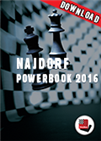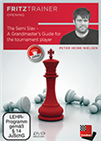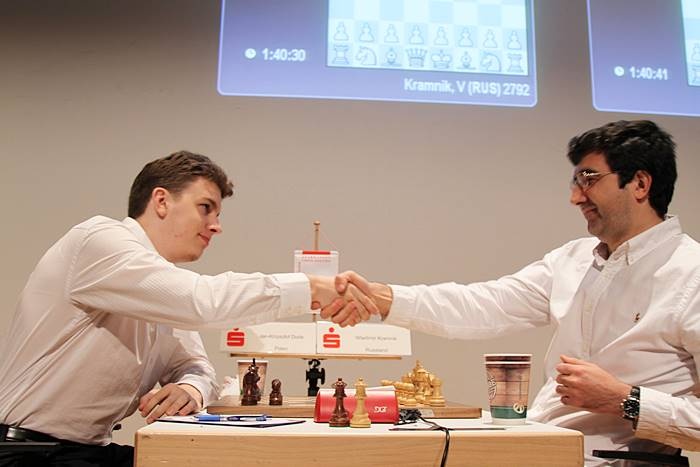Kramnik stops the youngster
Jan-Krzysztof Duda was the "man of the hour" after the first three rounds of the Dortmund Sparkassen Chess-Meeting. With a draw against Vladislav Kovalev and two victories — over Liviu-Dieter Nisipeanu and Radoslaw Wojtaszek — the young Polish champion had taken the lead in the standings at the Orchesterzentrum. Kovalev and Ian Nepomniachtchi, each with a win, followed him in second place.
In the fourth round, however, Duda had to overcome a particularly difficult obstacle: he was Black against the ten-time Dortmund winner Vladimir Kramnik.

Duda lost the lead against Mr. Dortmund | Photo: Georgios Souleidis
The 14th World Chess Champion chose the English Opening and got a slightly better position thanks to the pair of bishops. The isolated white doubled pawns in the centre gave the game a special touch.
Black continued, unimpressed, with 14...b6. The pawn on d5 is weak and will soon be lost. White's central pawns are safe for now but could also become weaknesses later. Under pressure, however, the young Polish GM did not find the best continuation, was forced to get on the defensive and finally landed in a worse rook ending. Here, Kramnik was in his element.
With 30.d5, White started marching his passed pawn down the board.
On this DVD Vladimir Kramnik retraces his career from talented schoolboy to World Champion in 2006. With humour and charm he describes his first successes, what it meant to be part of the Russian Gold Medal team at the Olympiad, and how he undertook the Herculean task of beating his former mentor and teacher Garry Kasparov.
Two early defeats, against Duda and Nepomniachtchi, left Liviu-Dieter Nisipeanu in the clear last place after three rounds. Yesterday, Germany's number one faced Anish Giri, not exactly the ideal opponent to get back in track.

Anish Giri defeated Liviu-Dieter Nisipeanu | Photo: Georgios Souleidis
The game started with a quiet variation of the Sicilian Najdorf and, here, the German player tried to play in classical positional style, looking to control the weak d5 square. White succeeded only temporarily, and when the queens were exchanged, Black got some counterplay on the queenside.
 The Najdorf Powerbook 2016 is based on a totally incredible number of games: 1.9 million! The lion's share is provided by the engine room on playchess.com, with the addition of 120 000 games from human experts. An essential tool for Najdorf specialists.
The Najdorf Powerbook 2016 is based on a totally incredible number of games: 1.9 million! The lion's share is provided by the engine room on playchess.com, with the addition of 120 000 games from human experts. An essential tool for Najdorf specialists.
White took on e5 here: 34.Nxe5 (better was 34.g3) and was clearly at a disadvantage after 34.Nd2 — 34.Rxb3 was also possible for White. Nisipeanu gave up the exchange and then fought unsuccessfully for the draw.
The second German player in the field, Georg Meier, had previously drawn all his three games and faced Vladislav Kovalev with White. On the board, we saw a frequently played variation of the Catalan. White could not get any advantage. Gradually, the pieces were exchanged until only one bishop remained for each side. The draw was agreed on move 40.

Round four underway | Photo: Georgios Souleidis
Radoslaw Wojtaszek and Ian Nepomniachtchi played a rare variation of the Slav Defence. After 1.Nf3 d5 2.d4, Black took his bishop out. Later, the Russian GM rerouted the same bishop to b7, while White built a very strong pawn centre.
 The Semi-Slav (1.d4 d5 2.c4 c6 3.Nf3 Nf6 4.Nc3 e6) can arise via various move orders, has decided World Championships, and is one of Black's most fascinating replies to 1 d4. Magnus Carlsen's second, Grandmaster Peter Heine Nielsen explains in detail what this opening is all about.
The Semi-Slav (1.d4 d5 2.c4 c6 3.Nf3 Nf6 4.Nc3 e6) can arise via various move orders, has decided World Championships, and is one of Black's most fascinating replies to 1 d4. Magnus Carlsen's second, Grandmaster Peter Heine Nielsen explains in detail what this opening is all about.
White, however, found no effective breakthrough in the centre, while Black developed counterplay on the kingside and was able to open a file on that flank. White decided that Black's initiative was dangerous and agreed to a draw by threefold repetition.
Standings after Round 4
Games of Round 4
Translation from German: Antonio Pereira
Links


























